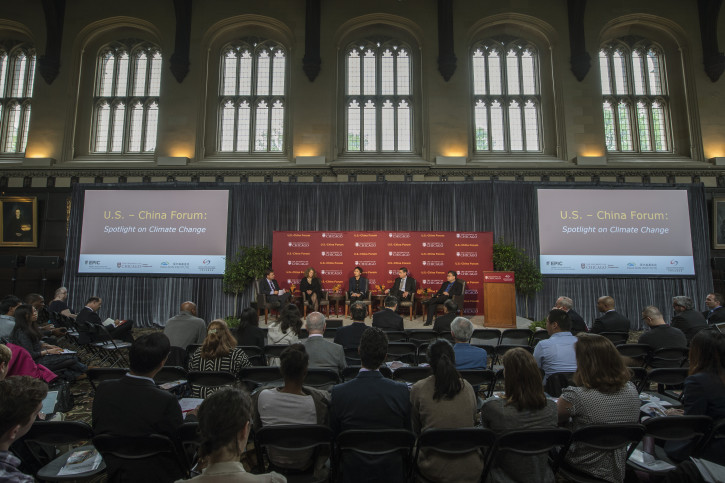By Dorinda Elliott

It’s a truth universally acknowledged: the more an economy develops, the more energy it uses. But just because it’s true doesn’t make it any less disturbing, especially in the face of global climate change. And so when Elizabeth Moyer, associate professor of atmospheric science at the University of Chicago, launched the discussion at a US-China climate forum at the University of Chicago with a chart illustrating the economic development trajectory of most of the world’s countries over the past hundred years, she sent a sobering message. The clustered dots went up and up and up, reflecting ever-growing energy use.
That chart does not bode well for the future, particularly given China’s ambitions: as China climbs the prosperity ladder, even despite the best of intentions the country may have to conserve energy use, its energy consumption will continue to grow. More importantly, what if China’s energy consumption continues to rely on carbon-emitting coal, which accounts for 80 percent of its total electricity? Moyers showed more slides illustrating a dramatic impact on climate, causing rising seas and ultimately, devastation for China’s low-lying coastal cities. “We aren’t going to conserve our way out of this,” Moyer said. “We are going to have to find more sources of energy.”
The discussions and presentations by American and Chinese experts speaking at the U.S.-China Forum on May 19, co-sponsored by the Energy Policy Institute at Chicago, the Paulson Institute and the China-US Exchange Foundation, couldn’t be more urgent. The scholars agreed on the need for the United States and China—experts, government and business leaders alike—to work together to tackle energy challenges and the economic transformation that fighting climate change will require. They noted that the US-China climate agreement signed in November 2014, in which China committed to peak its carbon emissions by 2030, represents a significant step forward: it signaled a new willingness on the part of China to work with the United States and perhaps even set a model for other nations to follow.
At the conference, Michael Greenstone, a leading economist and director of EPIC, presented his groundbreaking research on the health impact of carbon emissions in China. He has studied life expectancy North and South of China’s Huai River, which demarcates the dividing line for consumption of coal-fueled heat in China. (There is no government-supplied free heating South of the Huai River.) According to Greenstone’s research, people living North of the river live 5 fewer years than people to the South. “The world needs to strike a balance between development and the need to protect the environment,” Greenstone said. “The price of energy should reflect the damage it causes in terms of health and climate.”
Wang Litao, an expert on air pollution at the Hebei University of Engineering, mapped out China’s aggressive targets for reducing air pollution (PM2 fine particle emissions)—25 percent for the Beijing/Tianjin/Hebei region, 20 percent for the greater Shanghai region and 15 percent for the Guangdong Pearl River Delta region by 2017. There is some progress already, she noted. Handan (Wang’s home town), which is one of the most polluted cities in China, saw a 17.5 percent reduction in PM2 emissions in 2014, largely because the government shut down a number of inefficient, small coal-fired plants. “I’m optimistic, because of the very strict actions taken by local and central government,” Wang said.
How will China achieve its ambitious targets? Zou Ji, one of China’s leading climate experts and the deputy director general of the National Center for Climate Change Strategy and International Cooperation, said that China is working on many fronts, from developing new technologies to pushing for low-carbon urbanization, as some 300 million rural residents will move to the cities in the next few decades. But in the meantime, Zou said, China can’t shut down its coal-fired power plants, which for now are crucial for economic growth. He added that “China has the most advanced coal-fired technology,” with emissions, he said, comparable to that of natural gas. “We need to design the right strategy,” he said. “A change of value judgment will help China.” In other words, China somehow has to drive toward less individual energy consumption, not more.
That may not be easy, according to Pew Research presented by Dali Yang, professor of political science at University of Chicago. According to the survey, the environment doesn’t even rank second, third or fourth as a top complaint among Chinese citizens. (The rich-poor divide and corruption are the two top concerns.) Yang pointed out a generational shift, however, with more 17-29 year olds caring more about the environment across income groups than older age groups.
The morning session closed out with a wide-ranging conversation about China between Greenstone and Hank Paulson, chairman of the Paulson Institute and former Secretary of the US Treasury, who noted that the Paulson Institute is working on sustainable urbanization and climate change and air quality projects on the ground in China. “I believe that the US-China relationship is the most important in the world,” said Paulson. “We have plenty of differences, but a lot of shared interests, such as climate, and it’s harder to make progress on the areas where we have shared interests if we are not cooperating with each other.” Paulson called the recent US-China climate agreement “remarkable,” adding that “the biggest environmental and economic risk facing the world is climate change. The leaders in China are very committed to this.”



